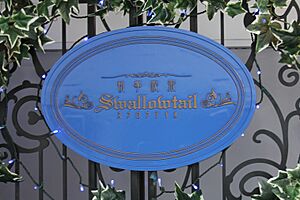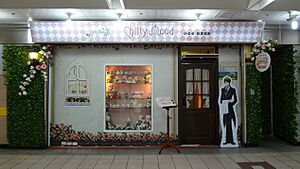Butler café
A butler café (called shitsuji kissa in Japan) is a special kind of restaurant. It started in Japan. In these cafés, the waiters dress up as butlers. They serve customers as if they were important guests in a fancy home. Butler cafés became popular because maid cafés were so well-liked. They offer a fun alternative, especially for girls who enjoy anime and manga.
Contents
How Butler Cafés Started

Maid cafés, where waitresses dress as maids, became very popular in Japan. This happened in the early 2000s. People noticed that many female fans of anime and manga wanted something similar. But they wanted male characters instead of female ones. So, butlers were chosen to be the male version of maids.
The very first butler café was called Swallowtail. It opened in March 2005. Swallowtail is located on Otome Road in Ikebukuro, Tokyo. This area is a popular spot for female anime and manga fans.
In 2006, another café called Butlers Café opened in Shibuya, Tokyo. This café was special because all its staff were men from Western countries. Customers could even practice English with the butlers! Butlers Café closed in December 2018.
Some butler-themed cafés in Akihabara, Tokyo, have female servers who dress as male butlers. This is a type of cross-dressing called dansō in Japanese.
Butler Cafés Around the World
Butler cafés are not just in Japan. Chitty Mood is a well-known butler café in Taipei City Mall in Taipei, Taiwan. Another one in Taiwan is Lan Yu Guan European Tea Restaurant. It opened in 2012.
In places like North America, Europe, and Australia, butler cafés sometimes appear for a short time. These are called pop-up cafés. They are often found at anime conventions. For example, Anime Expo in the United States and SMASH! in Australia have hosted them. SMASH! was the first anime convention to have a butler café.
What Happens at a Butler Café?
Japanese Butler Cafés
The main idea of a butler café is that you, the customer, are treated like a noble person. It's as if you have come home for tea. Your personal butler then takes care of everything. These cafés spend a lot of effort on making the place look nice. They also focus on giving excellent service.
When you enter, butlers welcome you "home." They use special titles for customers. Girls are called ojōsama ("milady") or ohimesama ("princess"). Boys are called bocchan ("young lord") or dannasama ("master").
The food served is usually very good. For example, the menu at Swallowtail was created by a food expert from a fancy hotel. The inside of the café often looks like a grand English country house. It has special furniture, some of it imported. Butlers might even tell you about the style of the decorations. They also describe the food items in detail.
English afternoon tea is the most common meal. It includes cakes, scones, sandwiches, and tea. The tea is served in beautiful porcelain cups. Sometimes, these cups are custom-made for the café.
Men who work as butlers can be from 18 to 80 years old. They get a lot of training. This training teaches them how to prepare tea, good manners, and how to serve customers. At Swallowtail, the training takes several months. Butlers have job titles like "house steward" for the main manager and "footman" for servers. Butlers also sometimes perform in shows or concerts. They might also sell souvenirs.
Usually, you cannot take photos inside butler cafés. But Butlers Café used to offer special photo services. You could get a "Lift Me Up Photo" where a butler would lift you up for the picture. "Cinderella Time" gave you bubbles, a tiara, and a silver bell. You could also "Study English" by exchanging notes with your butler.
Butler Cafés in Other Countries
Butler cafés outside Japan are similar in many ways. They often have similar ways to make reservations and serve customers. They also focus on butlers interacting with guests. However, there are some differences.
In Taiwanese butler cafés, the training for butlers is less strict. They learn more on the job. Also, the furniture might not be as fancy as in Japan. This is often because they have less money for expensive decorations. In Taiwan, the butlers show their role by how they act. This is because the Chinese language does not have special words like Japanese does to show who is higher or lower in social status.
Butler cafés at Western anime conventions are usually run by volunteers. These are people who love anime and manga. They are not usually trained service professionals like the butlers in Japan.


